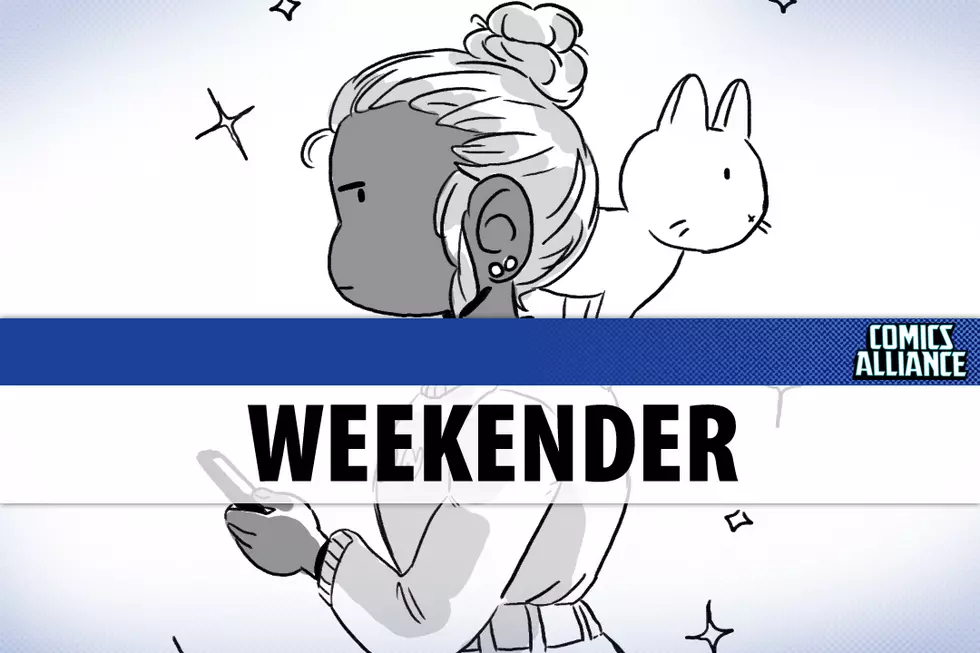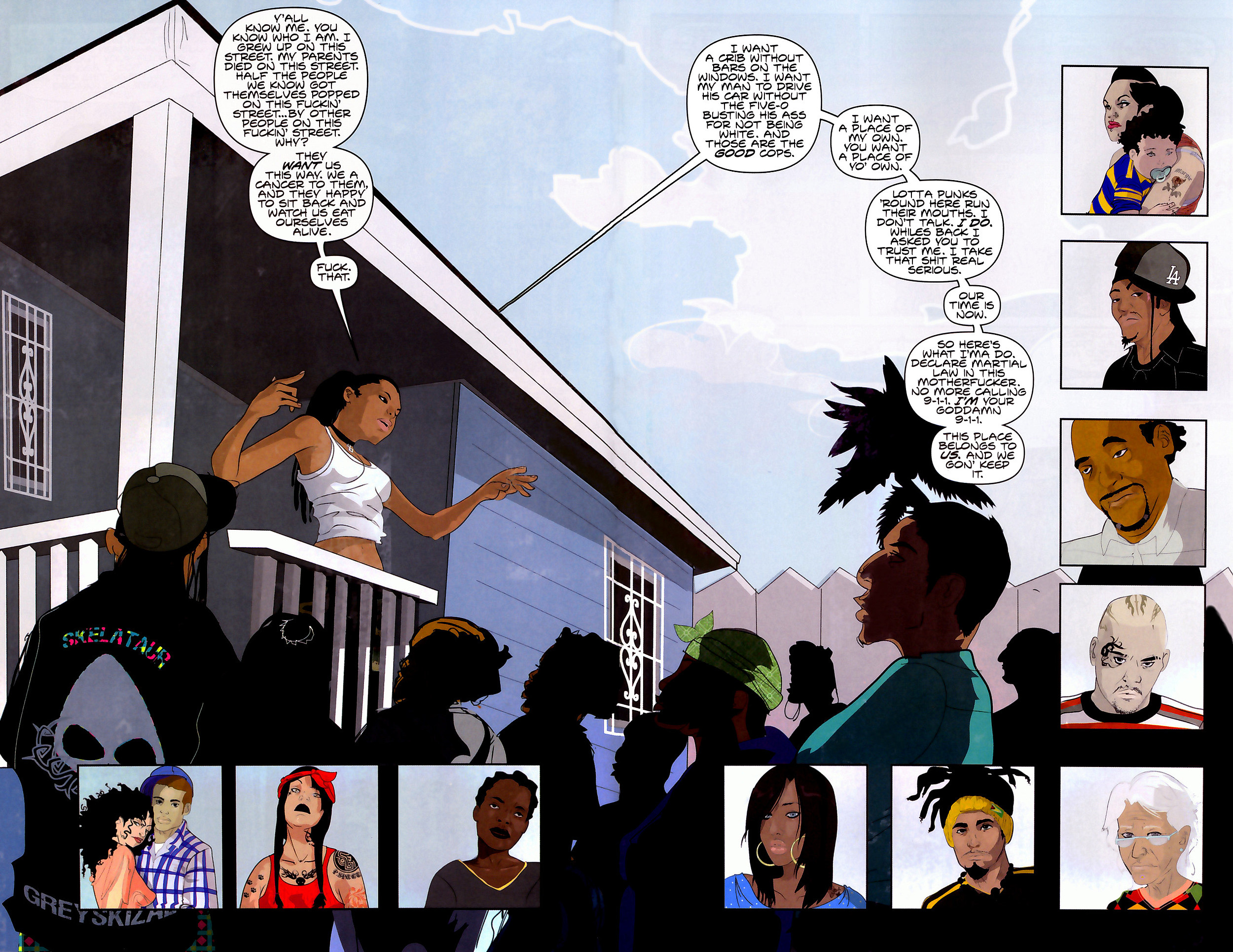![Welcome to the Terrordome: ‘Genius’ Fights the Power [Review]](http://townsquare.media/site/622/files/2010/08/genius-top-cow.jpg?w=980&q=75)
Welcome to the Terrordome: ‘Genius’ Fights the Power [Review]

In 1966, Bobby Seale and Huey P. Newton founded the Black Panther Party for Self-Defense to combat the astonishingly ruthless police brutality that affected their community in Oakland. The group took to the streets with a clear message: "If you are not going to protect us, we are going to protect ourselves." And so they did, by peacefully assembling and using the law against those who would do them harm. They exercised their second amendment rights and, when hassled by the police, quoted the law at them. The Black Panthers were not tactical geniuses or scholars, but merely men and women who knew their rights, knew the law, and chose to use that information to protect themselves and their people.
"Knowledge is power" is a common phrase, with roots that go back over two thousand years ago. It's popular and enduring because it's true. The Black Panthers had power because they knew their rights. In "Genius," writers Marc Bernardin and Adam Freeman and artist Afua Richardson explore a situation where a 17-year old girl uses her extraordinary knowledge to outclass, out-fight, and out-think everyone who would do her wrong and hold her down.
Destiny Ajaye was always smarter than the other kids. Playing games, picking up new skills, figuring out puzzles -- she was so good at it that other kids hated playing with her. She simply processed information differently, or perhaps better, and that always let her stay a few steps ahead. When her parents were killed by the police right in front of her eyes, Destiny was bounced into the Los Angeles's social services program and became part of the system.
She continued reading and learning over the years, amassing knowledge. And when she turned seventeen, she staged a takeover of the gangs in her neighborhood and placed herself at the top of the local food chain. She's tired of living in forced poverty and walled off from the American Dream. She's tired of seeing friends and family killed and abused for no good reason. She's tired of feeling like a prisoner.
Destiny has a plan, and that plan is the most American of things: armed revolution. The neighborhood will belong to the people, who will be free to chart their own destiny. Of course, there's no such thing as a bloodless revolution, and when the police attempt to restore their version of order to Destiny's neighborhood, they run right into a brick wall labeled "Tactical Genius." Destiny's ragtag army of gangbangers and locals decimate the trained policemen in minutes. Blame a combination of lowered expectations and the authorities simply being out-maneuvered and out-thought, but this brief outburst violence puts Destiny on everyone's radar.
Richardson's approach to violence is both matter-of-fact and highly stylized. Richardson's freeze frames of violence aren't sensational or overly gory, but her just-shy-of-realistic art makes "Genius" look almost like a really high quality animated movie. While the big bangs are what push the plot forward, Richardson renders lower key moments just as well. Destiny's way of thinking is presented in an inventive visual shorthand that is instantly understandable and worthy of poring over.

The story of the Black Panthers isn't too far off from what Bernardin, Freeman, and Richardson are doing in "Genius." In fact, there's an interesting line that connects history and fiction. Many street gangs in Los Angeles rose out of the remnants of the Black Panthers, after the local chapters were left rudderless with the collapse of the Civil Rights Movement. For example, Tookie Williams, one of the founders of the Crips, originally formed his gang in response to and in opposition to the gangs that were running wild over his neighborhood. Though it was meant to decrease the violence, the Crips eventually became the exact thing they were fighting against.
You could look at Destiny's bloody coup of the gangs as merely returning some of them to their roots: an emphasis on self-defense and self-policing. Which simply ties Destiny further into the Black Panthers, whose Ten Point Program was a road map for a better, and more fair, way of life, above and beyond the abolishment of police brutality. Destiny simply goes further than the Black Panthers did in the '60s and '70s.
"Genius" is Public Enemy Comix. I can feel Chuck D's presence behind the writing and art. It's not a stretch at all, honestly. Look at it this way: Destiny Ajaye becomes Public Enemy #1 when she chooses to become a Rebel Without A Pause. She proceeds to use her Black Steel in the Hour of Chaos in her attempt to Bring the Noise to the police, firm in her belief that 911 is a Joke.
This is subversive, clever stuff, particularly when you consider that "Genius" is published by Top Cow, a company best known for publishing the softest of softcore T&A comics. The positioning of the cops as antagonists, and the fact that Destiny is barely grown, black, and female adds up to a comic that runs counter to most action/adventure comics these days. This is what we need more of, the kind of brave work people make when they really care about what they're doing.

"Genius" is an edgy and smart comic masquerading as a bloody action comic. Police, women, and children are all in the firing line, and anyone can catch a bullet. Destiny's plan is borne out of a need to avenge her mother's death, but she's using it to better her life at the same time. It's a surprisingly radical work for the mainstream comics industry, where conventional wisdom suggests that a black, female protagonist doesn't sell comics and that the police are our friends. "Genius" presents the oft-ignored, but no less valid, viewpoint where the police are not protectors, but rather jailers or overseers.
You can find "Genius" in "Pilot Season: Genius #1" and the recently released "Top Cow First Look," which collects the next issue of "Genius" (and the first of its upcoming miniseries) and several other first issues in one volume for five bucks.
More From ComicsAlliance

![The Midnight Angels Take Take Flight In ‘Black Panther: World Of Wakanda’ #1 [Preview]](http://townsquare.media/site/622/files/2016/10/WOWFeat.jpg?w=980&q=75)
![Who Is Roxane Gay? Get To Know The Feminist Critic Who Just Became One Of Marvel’s First Black Women Writers [SDCC 2016]](http://townsquare.media/site/622/files/2016/07/rgbp_featured.png?w=980&q=75)
![‘Attack On Titan Anthology’ Unites Manga And Western Comics Artists [Exclusive Preview]](http://townsquare.media/site/622/files/2016/04/AOT-Featured.png?w=980&q=75)


![Nuclear-Powered Helicopter Action Is Finally Here In ‘Airwolf: Airstrikes’ [Preview]](http://townsquare.media/site/622/files/2015/09/Airwolf00.jpg?w=980&q=75)





